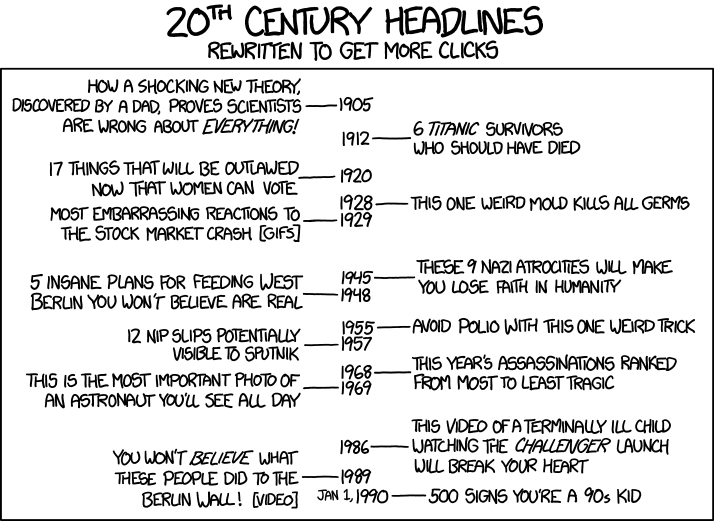An important part of any SEO strategy is writing links and headlines that search engines understand and that humans will want to click. It’s a delicate balance.
Go too far to the search engine side, and you end up with headlines like “Cheap Used Jeeps – Buy Used Jeeps Cheap | Shop Jeeps” (this phenomenon could be called Cheap Jeeps Cheap creep), but you go too far the other way and you over-sensationalise your links.
This is called clickbaiting because that’s basically what you’re doing: baiting readers into clicking based on a super-compelling headline when the content behind it is (usually) not as compelling.
- 28 Photos That Show The Difference Between Hipster Restaurants And Normal Restaurants
- Are You More Twenty One Pilots Or Panic! At The Disco Based On Your Zodiac?
- Can You See The Difference Between Red And Purple?
- Can You Guess Which Disney Prince Is Actually A F***boy?
These are all real Buzzfeed headlines that make you kinda-wanna click them and, at the same time, do not want too.

To Click or Not to Click?
Such are the cognitive-dissonantly complex feelings that hyperbolic and psychologically-created clickbait headings stir up. Right away we get that “I’ve gotta read that” feeling: we’ve subconsciously hovered over and come right to the brink of clicking them before we’ve barely finished registering what they even say.
Then two things happen at once: we’re still a little curious – intrigued by the ambiguous, teasing headline – but we know suddenly and right then that if we click we’re just going to be disappointed. Because have you ever read a clickbait article that didn’t leave you feeling short-sheeted?
Many websites that do this are probably patting themselves on the back right now. After all, getting the visitors in the first place is half the battle – and they’ve managed to achieve it just by getting their headlines down to a science (like this example from Nathalie Nahai).
But Maybe Don’t Do This
We care about attracting readers too – we’re SEO specialists after all – but we care a lot more about providing value to those readers and giving them an experience that will get them wanting to come back and ultimately become loyal customers of your brand.
So this why we’re saying, unreservedly: don’t write these clickbaity headlines! Your customers don’t deserve it, and neither does your content.
The things that make up links to your site: headlines, title tags and meta descriptions, anchor text (all the stuff that robots love to read as well as humans) should accurately reflect the content on your site.
If your content doesn’t really, genuinely offer 3 EASY THINGS YOU CAN DO AT YOUR DESK FOR A FLAT STOMACH IN A WEEK, don’t promise it in your headline.

Can You Spot the Clickbait?
Well. Even if you do have the world’s most amazing, life-altering content, still opt for headlines that are accurate and above all, authentic.
Think back to the headlines at the top of this post: did you feel that sense of impending disappointment before you clicked on them? Did you end up actually clicking any of them at all? Chances are that if your links look like clickbait, that’s what users will assume they are and they could well choose not to click.
As a quick experiment to see whether the quality of the actual content makes a difference with links that look like clickbait, we’ve taken five Buzzfeed news articles and mixed in five Pulitzer Prize winning articles that we’ve given clickbait headings (hence the “5 Reasons” promised in our own headline).
Can you weed out the disappointing content from the highly-acclaimed based on the links alone? Challenge yourself with our quick quiz, and let us know in the comments.
The cursor featured in the “Buzzfeed image used under CC BY: “3D Arrow Cursor” by StockMonkeys.com.

Comments (0)